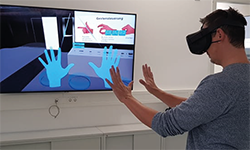Jan Niklas Schlichting
Master Thesis
2020/21
In colaboration with
MAN Energy Solutions
Comparison of controller and gesture control in virtual reality trainings

The use of virtual reality is becoming increasingly common in the context of training and education in industrial environments. Here, interaction with the virtual world is an essential component, which is why the integration and further development of different methods of control play an important role to minimize the differences between real and virtual world.
The goal of this master thesis is the prototypical implementation of a training module in virtual reality with two different control variants, namely controller and gesture control.
The evaluation of the user tests indicates that the learnability of both control variants is comparable. Clear differences can be seen in the realism and transferability of the virtually executed work steps: Here, gesture control performs better. Advantages of the controller control are a more precise interaction with objects as well as a higher feeling of safety during it’s usage.

A major part of this master project was the design and implementation of the virtual reality training with gesture control.
In two implemented levels of the training users can first of all explore and interact with a virtual injection nozzle. This is followed by several tasks to practise the preparation of an injection nozzle for maintenance. All interactions can be carried out either with gestures or with controller control. The choice of hardware was limited to the wireless Oculus Quest head-mounted display.
The comparison of the control variants was accomplished by testing 8 users with different backgrounds. Half of the participants came from the primary target group, MAN Energy Solutions technical documentation staff, the other half consisted of potential trade fair participants, the secondary target group.
The result of this work suggests that a revised gesture control can be profitably used in virtual reality trainings in an industrial context, since it offers a more realistic training and work steps can more easily be transfered to the real environment. In addition, gesture control offers advantages over controller control due to its intuitive operability for users inexperienced in virtual reality.
Nevertheless, further research should consider the collection and analysis of additional objective data. In particular, valid data from time measurements and a reasonable error rate could be used to gather meaningful data regarding the efficiency and reliability of the two control variants.
Furthermore, for the gesture control, an at-a-distance interaction as existing for controller control could also be implemented. This would provide a simplified method for grasping objects that can overcome hand tracking inaccuracies and thus increase the reliability of gesture control.
Additionally, for future work haptic feedback should also play an increasing role: In this context this could focus on implementing an existing method such as haptic gloves in a way that is easy to use and to combine with the hardware to enable an easy handling for users without any prior technical knowledge.

updated: 24. Feb 2021
